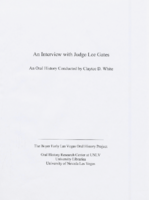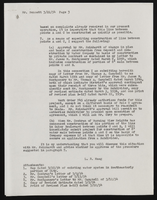Search the Special Collections and Archives Portal
Search Results

Transcript of interview with Charles T. "Blackie" Hunt by Cork Proctor, July 3, 2003
Date
Archival Collection
Description
Charles T. "Blackie" Hunt, born in Pottstown, Pennsylvania in 1930, started accordion lessons at age five. He recounts learning from experienced musicians, then teaching others at age twelve because his teacher was drafted. He attended West Chester State Teachers College where, among other accomplishments, he put together a group with Nick Carlino as tenor sax player. Blackie shares detailed memories of the many musicians with whom he worked and toured. They played in venues that included Harrisburg, Toronto, and Montreal, and eventually were offered a booking at the Sahara Hotel in Las Vegas. The group that Blackie worked with in Las Vegas, Tahoe, and Reno came up with the name "The Characters" (backward 'e'), and the show featured comedy and music. It was during this time that he met Lorraine (stage name Lauri Perry), who had her own group. They were married after a couple of years and Lauri joined The Characters. Blackie and Lorraine Hunt opened Blackie's Bar on Tropicana and Eastern Avenues in the seventies. He talks about the jazz sessions that took place and the musicians who sat in on them, and how he and Lorraine eventually decided to bow out of show business themselves. The Hunts went on to open the Bootlegger, a restaurant/piano bar on Las Vegas Boulevard. They started a little comedy/music session called "Off the Cuff', in which local or touring musicians, comedians, and singers often participate. Blackie and Lorraine have been part of the vibrant history of Las Vegas and the state of Nevada for many years, and continue to make their home here.
Text

Hildred Meidell interview, February 27, 1979: transcript
Date
Archival Collection
Description
On February 27, 1979, collector Greg Abbott interviewed Hildred Meidell (b. March 17, 1900 in Webb City, Missouri) about her time living in Las Vegas, Nevada. Meidell covers a range of topics, from her and her husband’s time as tourists in the city and their subsequent retirement to Las Vegas from Los Angeles, California. Meidell describes the Las Vegas Strip, the interstate and highway conditions between Los Angeles and Las Vegas, as well as their numerous visits to Hoover Dam (Boulder Dam). Moreover, she speaks about the changing layout of the city, the increase in shopping centers and department stores, and the clothing stores inside of hotels. Lastly, Meidell talks about the prominence of churches in local communities, the atomic testing program and the structural damages these tests caused in her neighborhood, and the influence of the railroad and passenger train on the town.
Text

Transcript of interview with Judge Lee Gates by Claytee D. White, December 5, 1996
Date
Archival Collection
Description
Interview with Judge Lee Gates conducted by Claytee D. White on December 5, 1996. Born in Louisiana, Gates moved to Las Vegas around 1960. Following high school, he attended UNLV, where he was a member of the Black Student Association and studied under professor Roosevelt Fitzgerald, who raised his awareness of black history. Gates participated in the civil rights movement and worked as a lawyer before becoming a judge. He discusses Jackson Street, Dr. Charles West, attorney Charles Kellar, and his own involvement with Ruby Duncan's group.
Text
An Interview with Barbara Buckley, Kevin Buckley, Michael Buckley, Jill Buckley and Lindsay Stilwell
Identifier
Abstract
Oral history interview with Barbara Buckley, Kevin Buckley, Michael Buckley, Jill Buckley and Lindsay Stilwell conducted by Claytee White on January 28, 2014 for the West Charleston Neighborhoods-- An Oral History Project of Ward 6. Kevin discusses the early Pinto Palomino neighborhood, working as a teenager, black-white relations, his education, serving as one of Howard Hughes physicians, and the move to Las Vegas. Barbara talks about the difference between Flintridge, California, and Las Vegas in 1968 when the family first arrived. The family members also discuss community participation and hotel-casino entertainment for young couples, and rearing children in Las Vegas.
Archival Collection

Transcript of interview with Sherwin "Scoop" Garside by David Anderson, March 25, 1976
Date
Archival Collection
Description
On March 25, 1976, David Anderson interviewed Sherwin “Scoop” Garside (born May 26, 1915 in Tonopah, Nevada) about his life in Southern Nevada. Garside first talks about his father’s business in running an early Nevada newspaper and his personal knowledge of the early mining that took place in different parts of Nevada. He also talks about living in the town of Tonopah, the American Indians who lived in the area, and his experiences from living in Las Vegas. Garside also mentions the beginnings of gambling in Las Vegas, the population boom periods of Las Vegas, and his experiences in witnessing the aboveground atomic testing.
Text

Al McDaniels interview, February 28, 1980: transcript
Date
Archival Collection
Description
On February 28, 1980, Rodney Goosby interviewed Al McDaniels (b. 1940 in Muskogee, Oklahoma) about his life in Las Vegas and his career as an athletic coach. McDaniels, referred to as Coach by Goosby, speaks primarily about his time as a coach for track and field at the University of Nevada, Las Vegas, his community involvement and the city’s recreational activities. Moreover, McDaniels speaks about his education and his current research as he works on a doctoral degree in physical education. Lastly, he talks about the city’s growth and the move from empty desert spaces to housing and shopping center constructions.
Text

Transcript of interview with Jerry Engel by Barbara Tabach, March 1, 2016
Date
Archival Collection
Description
Jerry Engel was born in 1930 in New Jersey and spent most of his early life in Long Beach, New York until the family moved westward to Las Angeles. Jerry is a retired Certified Public Accountant and loves to talk about the history of Las Vegas that he observed since arriving in 1953. That was the year that he moved to Las Vegas to join his older brothers, Morris and Phil, in their accounting firm. Their major client at the time was Desert Inn. Another personal connection with local history: the Engel brothers? mother, Esther Katz Engel, was among the early investors in the Moulin Rouge hotel/casino enterprise. Jerry graduated with honors from University of California, Los Angeles in 1951. His accounting career in Las Vegas is highly regarded and he continues to maintain a consulting practice. He remains active within the community and enjoys doing presentations based on his memories of Las Vegas history. Within this interview, Jerry highlights people, casinos and other observations of local history that he came into contact with over the decades. He provides insights about the role of an accountant in the gaming industry. He also discusses the influence of Jewish business leaders in and array of local gaming and non-gaming issues, including the retail world, Jim Crow era segregation, and the astonishing growth of the valley over six decades.
Text


Moises Denis interview, January 11, 2019: transcript
Date
Archival Collection
Description
Interviewed by Marcela Rodriguez-Campo. Laurents Bañuelos-Benites, Maribel Calderón, and Barbara Tabach also participate in the questioning. Moises "Mo" Denis is a Cuban American born in Brooklyn, New York. He served as the first Latino Majority Leader in the Nevada State Senate and has been involved in public service for over 30 years. As a leader in the Church of Latter Day Saints and his involvement with supporting Latinx initiatives, Mo has been able to increase the representation of Latinos in politics and support educational reform. While early on his family moved around a lot, they finally settled in Las Vegas and have continued to grow their family. Mo is a Rancho High School alum and went on to graduate from Brigham Young University as a music major. He first started his career by opening a music store, but later began working in the tech industry. Eventually, through his involvement in the PTA, Mo was appointed to serve on the Clark County Library Board. There he was involve
Text

